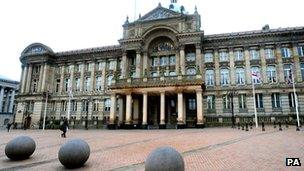Midlands pain and gain in spending review
- Published
- comments

Lord Heseltine's report recommended power being devolved from government to the English regions
Britain's biggest local authority had already set the scene.
The day before the chancellor unveiled the government's spending review, Birmingham City Council announced sweeping proposals for the privatisation of education services which could lead to schools admissions, meals and transport functions being outsourced.
The controlling Labour group's cabinet member for schools, councillor Brigid Jones, said she had to find savings of £20m and identifying these sorts of efficiencies had become a rolling, year on year process.
So when the chancellor confirmed a 10% cut to the Department for Communities and Local Government during 2015-6, there was a general air of inevitability about it.
Yet more council job losses and service cuts, on top of the ones we know about already, will stem directly from this Spending Review - how many and where will be the subject of even more of those famous "hard choices" over the next two years.
After all, local government accounts for about one fifth of all public spending in the UK and when local services are hit people tend to blame the council rather than the government.
All part of George Osborne's plan to save £11.5bn during the year after the general election.
Ambitious proposals
But if the general flow of traffic was heavily in one direction, what could he offer to get our part of the country heading in a more positive direction?
Mr Osborne said he was calling for these sacrifices from local authorities in return for what he believes will prove to be a significant devolution of powers and money to local decision-makers to trigger economic growth.
Called The Single Growth Fund, it began as one of the key recommendations enshrined in the report unveiled in Birmingham last November by the former Deputy Prime Minister Lord Heseltine.
Just days before the chancellor's statement, a cross-party group of no fewer than 18 MPs with constituencies in the Greater Birmingham and Solihull area, wrote to him urging that he ensure the fund was "wide in scope and substantial in scale" so that local areas could achieve their full potential in driving growth.

The council has announced sweeping proposals for the privatisation of education services
They pointed to the work the area's Local Enterprise Partnership (LEP) had put in to ambitious proposals for a new business district, on a scale akin to London's Docklands, near the junction of the M6 and the M42 and the expanded Birmingham Airport.
Dubbed "UK Central" by the LEP, it would, they reckon, create no fewer than a quarter of a million new jobs.
That's the theory.
In practice, the money promised by the chancellor is far less than some of the fantasy numbers bandied around at the time of Lord Heseltine's report - £10bn over the five years of the next parliament to be contested in bidding rounds by local decision-makers the length and breadth of the country.
It certainly fell well short of the Birmingham and Solihull Chamber of Commerce's expectations. They said it was not sufficient to have a significant effect and amounted to no more than the government paying lip service to the idea.
At least the Birmingham and Solihull area has been chosen to "pilot" devolved growth funding so local leaders will certainly hope to be at the front of the queue.